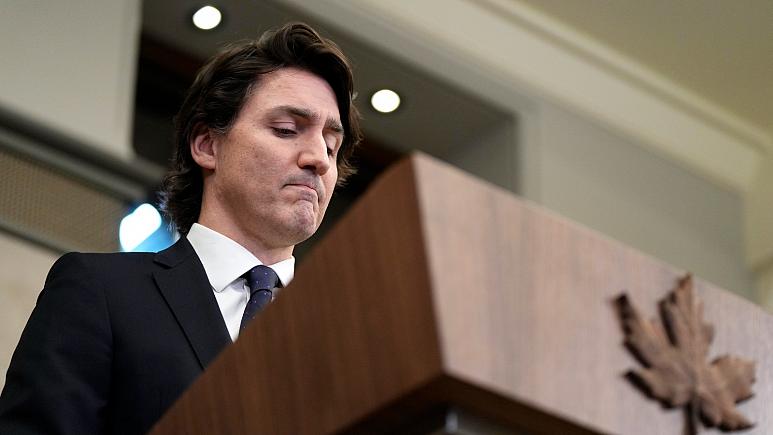Canada threatens drivers protesting against Corona’s mandate to freeze their bank accounts
The Canadian government has threatened that it will freeze the bank accounts of truck drivers, who continue to impose the blockade, in protest of the mandates of the anti-coronavirus vaccine.
According to “Sputnik”, the government warned in a press conference held, yesterday, Monday, that it would suspend vehicle insurance for drivers, and Canadian Deputy Prime Minister, Chrystia Freeland, said: “This is about following up on the money, this is about stopping the financing of this illegal blockade.”
“Today we are giving a notice that if your truck is used in these illegal blockades, your company’s accounts will be frozen, and your vehicle insurance will be suspended,” she continued.
“Personal financial accounts will be included in the application,” Freeland added at another point in the conference.
“Send your trailers home, the Canadian economy needs them to do legitimate work, not illegally make us all poorer,” she said in a message to truck drivers.
Canadian Prime Minister Justin Trudeau, who was standing behind Freeland as she spoke at the press conference, announced that he would pass Canada’s far-reaching emergency law for the first time in the country’s history.
The Canadian government’s recent decisions are the latest effort by the Trudeau administration to combat the “Freedom Caravan” protests of truck drivers, which began in the Canadian capital Ottawa on January 28 and have since spread across the country.

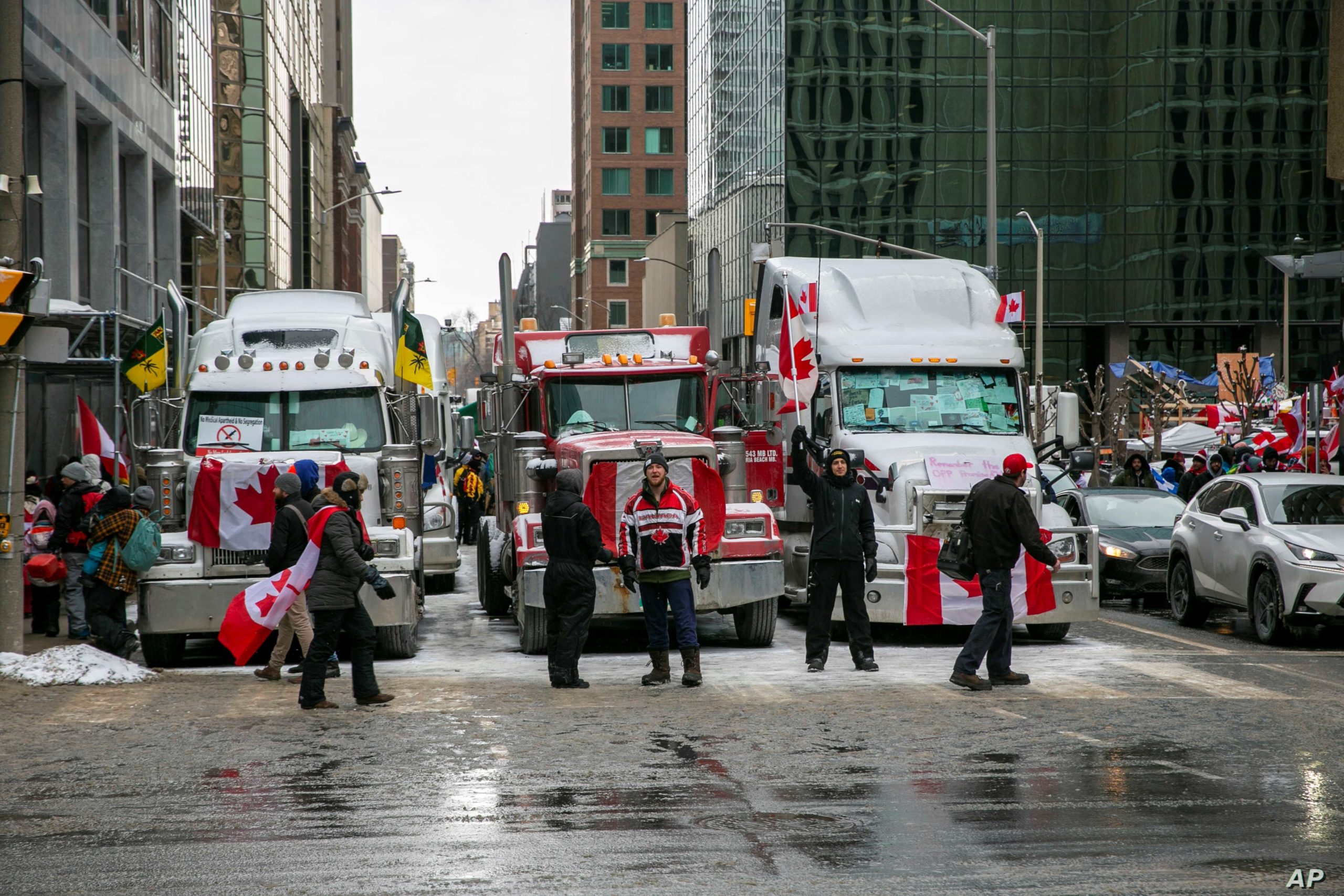
Canadian Minister: We are studying the use of emergency powers to end the “siege” of those demanding the lifting of Corona restrictions
Canada’s Emergency Preparedness Minister Bill Blair said Sunday that Prime Minister Justin Trudeau’s government is considering using emergency powers to end a blockade that has crippled cross-border traffic and paralyzed the city of Ottawa.
“Certainly,” Minister Bill Blair, asked by the Canadian “Global News” network, whether his government is ready to implement the Emergency Law, a rarely used legislation that gives federal authorities exceptional powers to confront national threats.
“I want to assure you that we understand the threat to Canada, Canadians, our livelihoods and our prosperity that these protests represent. It’s not about vaccines anymore. This is something else and very worrying,” he said. But Blair indicated that the federal government would only take action. The extraordinary measure – which has not been invoked since the October crisis in 1970 – after provinces exhausted their powers and turned to Ottawa for more help.
Blair, the former chief of the Toronto Police Department, added that Canadians “need the police to do their job, and to that end, we’ve been working to make sure they have the resources and tools they need to do that.”
“But it is ultimately about the following: the police must restore order and enforce the law,” Blair said.
It is noteworthy that the convoy of protests in Ottawa, which local officials and politicians likened to a “siege” and “occupation”, now extends into a third week.
Right-wing demonstrators are demanding the removal of health restrictions linked to the pandemic, while many want to oust Prime Minister Justin Trudeau.

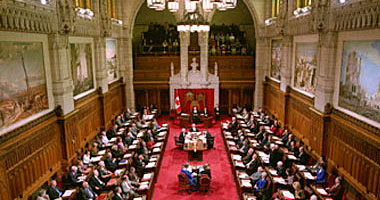
The Egyptian ambassador to Canada discusses ways of cooperation with the province of Quebec
Ambassador Ahmed Abu Zeid, Egypt’s ambassador to Canada, met via video conference today, Thursday, with the leaders of the Africa and Middle East sector at the Ministry of Foreign Affairs of the Province of Quebec, as part of efforts to communicate with the various Canadian provinces, to explore areas of economic, academic and cultural cooperation and to enhance Canadian investments with Egypt, especially since Quebec is the largest province in terms of area in Canada, and accounts for approximately 21% of the volume of trade between Egypt and Canada, and is home to one-third of the members of the Egyptian community.
In a statement to the Egyptian ambassador after the meeting, he explained that the meeting witnessed a lengthy dialogue on ways to enhance economic, trade and investment relations between Egypt and the province of Quebec, especially in areas where the province enjoys a high competitive advantage, such as space, information technology, software, green economy projects and education.
Ambassador Abu Zeid added that, during the meeting, he reviewed the developments that Egypt is witnessing in all areas of production, services and economic growth despite the conditions of the Corona pandemic, and with the testimony of international organizations and classification institutions, and the promising investment opportunities Egypt provides in mega national projects and others, proposing the organization of events and visits for businessmen. And officials from both sides to activate investment and economic cooperation, as well as enhance cooperation in the field of environment in light of Egypt’s presidency of the 27th session of the Conference of Parties to the United Nations Framework Convention on Climate Change.
The Egyptian ambassador also discussed the development witnessed by the education sector in Egypt, and plans to expand academic and research cooperation with major foreign universities, proposing the development of a joint action plan that would contribute to increasing the number of scholarships offered to Egyptian students in the canton’s universities, which are at the forefront of international universities in terms of scientific and academic classification. Expanding research and academic cooperation between the two sides.
At the end of the meeting, the Canadian official was keen to invite the Egyptian ambassador to visit the province of Quebec during the coming period, to find out about the existing cooperation opportunities, to visit a number of projects and to hold meetings with the province’s prime minister and a number of ministers and representatives of the private sector, as well as to visit Parliament and meet with its deputies. .
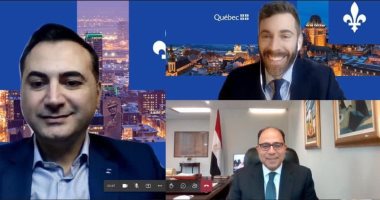
Truck drivers in Canada continue to protest against mandatory vaccinations..and Trump supports them
Dozens of truck drivers and other vehicles continued to close the center of the Canadian capital, Ottawa, for the second day in a row, after thousands headed to the Canadian capital on Saturday, to protest against Prime Minister Justin Trudeau and the decisions to compel vaccination against the Corona virus in Canada.
Trucks were parked in the streets near Parliament House on Sunday, a day before lawmakers are due to return to work after the holiday season ends. There were hundreds of protesters as well. Some truck drivers said they would not back down until the mandatory vaccination was reversed.
Former US President Donald Trump praised during his speech on Saturday the Canadian protesters for their courageous resistance to what he described as illegal mandatory orders, in what Reuters said was a sign of the polarization caused by the epidemic, which was present in the United States and began to spread to Canada.
In solidarity with the Ottawa rally, truck drivers and protesters blocked a border crossing between the United States and Canada in southern Petra, police said on Twitter.
Canadian Prime Minister Justin Trudeau and his family left his home in central Ottawa on Saturday for security reasons, and Trudeau said last week that the protesters represented a small minority who did not express the views of Canadians.
Reuters said that about 90% of truck drivers across the border in Canada, and 79% of the total population, have received two doses of the Corona vaccine. Canada is now witnessing an outbreak of the Omicron mutant, which is leading to a rise in hospital infections.
The Minister of Transport, Omar Al-Ghabra, ruled out any retreat from the mandatory vaccination, and said in an interview that vaccines are the best way to protect ourselves and our economy from Covid 19. It is not acceptable to see the swastika anywhere.
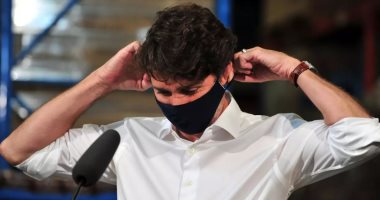
Trudeau announces the activation of the emergency measures law to contain the protest movement in Canada
Canadian Prime Minister Justin Trudeau announced on Monday the activation of the Emergency Measures Act to end the “unlawful” immobilization of demonstrators opposing the health measures adopted in the country, which has been going on for more than two weeks.
“The federal government is resorting to the Emergency Measures Act to strengthen the powers of the provinces and regions and confront occupations,” Trudeau said, explaining that the army would not deploy and that the new measures “will be limited in time and geography.”
The protest movement continued Monday despite the reopening of the Ambassador Bridge, the strategic border artery, which prompted the province of Ontario to announce the abandonment of the vaccination certificate.
Earlier on Monday, Trudeau had discussed with the prime ministers of various Canadian provinces the possibility of using this law.
This law can be resorted to in the event of a “national crisis” and it gives the federal government additional powers to put an end to the crisis because it provides the possibility for it to “take temporary exceptional measures.”
And Justin Trudeau, who was under great pressure, said Friday that “all options are on the table” to end the “illegal” occupation operations that harm the country and its economy.
The Emergency Measures Act was used once in peacetime and was invoked by Trudeau’s father during the October 1970 crisis. The government of Pierre Elliott Trudeau at the time used this law to send the army to Quebec and to take a series of emergency measures after the Front for the Liberation of Quebec kidnapped British Trade Attache James Richard Croce and a minister from Quebec named Pierre Laporte.
Cross was released after negotiations, but the minister was found dead in the trunk of his car.
“Under this law, the government can confiscate property and services and seize people,” said Genevieve Tellier, a professor of political science at the University of Ottawa.
“keep pressure”
On Monday, Canadian police seized weapons and ammunition, and arrested 11 people who were paralyzing a border crossing between Canada and the United States in Coats, Alberta, and seized weapons and ammunition, as part of a protest against anti-Covid-19 measures.
The Royal Canadian Mounted Police said they seized rifles, pistols, a machete and a “large amount of ammunition”.
An investigation was opened to “determine the level of threat and the criminal organization” behind it.
On Sunday evening, after a seven-day paralysis, police managed to reopen the Ambassador Bridge, which connects Windsor, Ontario, to the US city of Detroit, in the state of Michigan. The disruption of movement on this vital border artery prompted Washington, worried about its economic repercussions, to intervene with Trudeau to resolve the situation.
On Monday, Ontario Premier Doug Ford announced the abandonment of the vaccination certificate in the province, which has been the center of protests against health measures to combat Covid-19 since late January.
“We will give up passports” health on March 1, Ford said during a press conference, explaining that the majority of citizens are now vaccinated and that the peak of Omicron is over.
But in Ottawa, opponents of the health measures still occupy downtown streets, especially Wellington Street in front of the Canadian Parliament. About 400 trucks are still in place, well organized, with heating tents and food kiosks…
They appear more determined than ever, despite the possibility of a fine of up to 100,000 Canadian dollars or even imprisonment, since the state of emergency was imposed on Friday.
“Leaving is not in my plans,” said Phil Rio, 29, sitting in his truck. “By applying pressure, we can achieve our goal.”
The protesters have been demanding the lifting of all health measures for more than two weeks.
